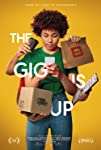Eye For Film >> Movies >> The Gig Is Up (2021) Film Review
The Gig Is Up
Reviewed by: Andrew Robertson

There's a line from Heywood Broun that I've heard adapted in various forms, but his is perhaps the earliest - "a technical objection is the first refuge of a scoundrel". That's not a quote from the film, I'm giving you that for free in the hope of enticing you to commit further. Here's another bon mot. When people ask me what the gig economy is I sometimes say, "Remember that bit in A Christmas Carol where Scrooge leans out the window and shouts some variant on, 'You boy, what day is it?' and then sends him to rouse a variety of tradespeople so he can turn up unannounced at his employee's house with a large plucked domestic task for a spouse who had doubtless made other arrangements?"
In an international film that bounces between special economic zones (various senses) like San Francisco and Lagos and Shenzen we are given an overview of the gig economy, its attractions, its weaknesses, its ideals and (some) of its abuses. Injured cyclists on the streets of Paris, gold teeth on the streets of Mims. That's Mims, the census-designated place about 44 miles outside Orlando, an unincorporated municipality most famous for Klan murders of NAACP volunteers and where, on a clear day, you could likely see the skinny white trail of rockets clawing their way to space from the surly bonds of nearby Cape Canaveral. I looked up that place out of curiosity, information sourced from that utopian piece-work that is Wikipedia, and the commercialisation of geography that is Google maps. The film doesn't mention the contrast between the twin shadows of the happiest place on Earth and the bunker complex temporarily named for a dead man where a tricoloured flag was carried to a monochrome moon. It, like many things, is charitably left as an exercise for the reader, but in keeping with the theme of the film I have done that bit of work for you.

There are several places where statistics are given without context, and the background reading is a gloss of imagery. There's a figure given that 540m will be employed within or by the gig economy by 2025 but no citation given. A later statistic about a specific food deliver market being worth US$51bn in 2020 is only later attributed to 410m users (since it's a leap year that's 34 US cents a day, and I'm rounding up). This is one of the issues with the gig economy, not just "the tyranny of the algorithm" but the unfettered statistic. Somewhere between Stalin and a carpet salesman is "never mind the quality, feel the width".
There's mention of the Mechanical Turk, namesake of the service that made money from what is referred to as 'ghost work', the sense of washing human services to give them the veneer of computing. Hidden Figures covered some of this, there are jokes made about the power of the devices that went to the Moon out there but they rarely reckon with the number of operations per second that were being performed by tens of thousands of men and women. Some with ambitions to space like Jeff Bezos of Amazon are more cognisant of that other chessboard entity and their doubling by square. From tiny acorns do mighty apple corporations grow.
There are some interesting discussions within the film, an argument that "convenience maximalism" and San Franciscan piece-work utopianism represents a "millennial lifestyle subsidy". There's some measure of discussion of exploitation but there are some leaps that seem obvious not taken. There's a discussion of hyper-vigilance by users of gig economy apps, but it doesn't take a sociologist to wonder if there's a line between FOMO and abusive relationships that's not being drawn.
There's a good discussion of rating systems and the way that many of these systems outsource being petty and biased to customers and not managers. The consequences of this lack of forgiveness is written in flesh and bone, a panel covering a wall. There is in many of these the wash of objectivity, if enough people pick a number to describe something you can derive statistics from that number, but your tomato may not be rotten you may just not like the flavour.
It would have been nice to see more of this film. Not just because it's relatively short, but because there are things that I'm aware of that I felt it lacked that would have helped its case. There's not mention of the ludicrous market valuations of firms like Uber and WeWork, nor discussion of their 'burn rates'. There's not mention of the extent to which these firms are, like so many bits of the tech industry, predicated upon American understandings of the how the world works. 'American exceptionalism' often means that everybody else does it differently, and often with good reason. There's no discussion of 'at will' employment. There is mention (in the Paris story) of the coercive impact of private healthcare. Showing how US employment differs from most everywhere else could and does show why these roles can be attractive. These are only relative kindnesses, some of which are explored in things like Sorry We Missed You.
The documentary also suffers a bit from lag. As I was watching it someone with an LCD screen on their head was pretending to be a robot for Tesla. The hype that suggests your rideshare services would be automatically navigated is starting to pale. There was a pandemic, you might have seen something about it. There's also an interesting economics pre-print circulating at the moment that talks about surge pricing as a harm to customers, with antitrust implications baked in. That last is important because since Reagan market dominance alone is apparently not enough to warrant break-up, though this view is changing. The notion that rationing existing supplies by ability to pay does not increase capacity is one of those 'obvious' implications that are obfuscated by the way that pricing structures are constructed. That drivers don't get more when customers are paying more is hidden. What isn't is that something that is neither auction or queue operating in something that is not a fair marketplace is a cause of concern.
There's reference to some of these things, but not those specifics. Detail is often surface. There's Facebook furniture on small video interviews, the staccato progress bar of 'stories'. There's iPhone-like messaging too with context, but reducing the tale of the Mechanical Turk to a couple of images is to miss how captivated courts were by what was a grift. I use 'courts' there in the royal sense, but this film could also have done with more discussion of regulatory capture and tech-washing.
Labour has ever had the potential to be exploitative, but perhaps it's my politics that means that this work doesn't feel angry enough. For sure, the drifts of bicycles like courier-carrying-confetti are an outrage, but a beautifully documented one. The treadmill of online tasks to lottery scratchers is a bleak one. The potential distortions of an interview with 'a Black Republican' are left to inference and not implication. The balances between services that mean drivers have two phones (if not three) on their dashboard are not navigated.
We could argue about how fair it is to judge a documentary for not digging deeply enough, but when one of the arguments is a reflection on gloss I don't think it unkind to ask to see what's behind it. Though it is wide ranging in both topic and geography this stops feeling like variety and starts to feel like patchiness. With some of these apps achieving sufficient ubiquity that they form background radiation to different creative goals (Night Drive, Countdown, Zola, Mainstream) it would be nice to go deeper.
Director Shannon Walsh has several feature documentaries to her name, but all of them are ensemble or multi-subject pieces, even if they explore single topics they do some from different viewpoints. That's not in and of itself a weakness, but stories in aggregate need more teased from them to weave together properly. Though The Gig Is Up is a reasonable introduction, I wanted more from it and shall rate it accordingly.
Reviewed on: 24 Aug 2021















